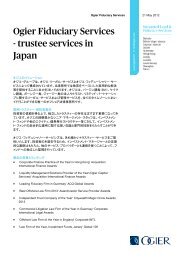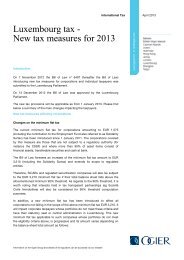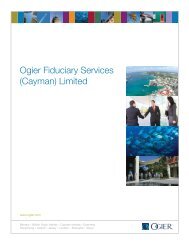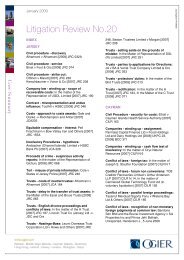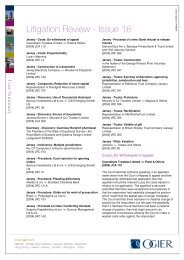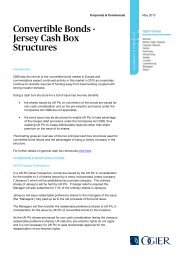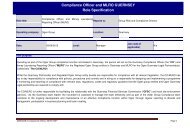April 2008<strong>Litigation</strong> <strong>Review</strong> - <strong>No</strong>. <strong>19</strong>Case SummaryDisclosure - <strong>No</strong>rwich PharmacalMacdoel Investments Limited v the FederalRepublic of Brazil & Ors [2007] JCA 069The Federal Republic of Brazil sought disclosure ofcertain documents in connection with the investigation ofcivil fraud claims against Paolo Maluf and others. Theallegations against Mr. Maluf involved conspiracy,corruption, embezzlement of public funds and moneylaundering, in connection with two major public worksprojects that were undertaken in Sao Paolo when Mr.Maluf was mayor. It was alleged that the price of theworks was fraudulently inflated and the excess, runninginto hundreds of millions of US dollars, was diverted intothe hands of Mr. Maluf and/or individuals or entitiesassociated with him, including members of his family, viabank accounts in Switzerland and Jersey. The FederalRepublic of Brazil convened various banks as defendantsand sought disclosure from them of documentationrelating to accounts held by them in the names of theappellants and certain other individuals and entities,including Mr. Maluf.The Royal Court ordered disclosure in the terms soughtand the appellants appealed that order on the ground thatthe <strong>No</strong>rwich Pharmacal jurisdiction did not provide a legalbasis for the type of disclosure ordered and the evidencewas insufficiently strong to warrant disclosure under theBankers Trust jurisdiction. The second ground of appealwas that if the Royal Court had the power to orderdisclosure, it erred in the exercise of its discretion in doingso and that the Federal Republic had no sufficient interestto bring the proceedings under Jersey law.The Court reviewed all the relevant UK authorities on<strong>No</strong>rwich Pharmacal and Bankers Trust relief, dismissedthe appeal and enunciated the following importantprinciples.• Where disclosure is sought from a defendant who isalleged to have become innocently mixed up inwrongdoing, the determinative question in any particularcase is whether justice requires discovery to be ordered.This means that the availability of <strong>No</strong>rwich Pharmacalrelief is not limited to cases where it is necessary toidentify the wrongdoer, but it also extends tocircumstances where, e.g., to determine the location ofembezzled funds or the methodology of the fraud.• The <strong>No</strong>rwich Pharmacal jurisdiction is not necessarilyrestricted to cases in which the facts are similar and inapplying it, the Jersey courts will have regard to,amongst other things, the policy considerations whichshape the law of Jersey and the social and economiccontext in which it operates. A relevant factor is that theJersey courts are conscious that Jersey’s reputation asa major financial centre might suffer if it were not willingto assist victims of wrongdoing to obtain redress.• Against that background, the test was whether the RoyalCourt was satisfied: (i) that the respondents were thevictims of wrongdoing and (ii) that the banks hadADMIN-14369297-2become mixed up in the wrongdoing. The threshold forthe Royal Court being satisfied that a defendant hasbecome mixed up in alleged wrongdoing, so as to owethe plaintiff a duty of disclosure may be stated asfollows. Disclosure will only be ordered if there is noother source of information that will assist the personwronged. It is not unjust that a duty to disclose existwhere the court is satisfied that there is a reasonablesuspicion that the third party has been mixed up in thewrongdoing. Something less than prima facie evidenceof wrongdoing is sufficient and there is no reason torequire a higher threshold.Jurisdiction and forum non conveniensBall v King [2006] JRC 143The case concerned the circumstances in which theCourt could retrospectively grant an extension of time fortaking the formal steps necessary to start a jurisdictionchallenge. Rule 6/7(3)(a)(ii) of the Royal Court Rulesprovides that an application must be made to the Bailiff’sJudicial Secretary to fix a date for the hearing of thechallenge to the jurisdiction within 28 days after the actiongoes onto the Pending List, which starts the pleadingstimetable running.In this case, the summons disputing jurisdiction wasissued in time by the Defendant, but it was mistakenlyissued before the Master rather than the Bailiff and thePlaintiff’s advocate did not take the point. The summonswas subsequently adjourned by consent and eventuallywhen it came on for hearing the parties realised that theMaster had no jurisdiction. The Defendant then soughtleave to issue a summons out of time.The Court found that the interests of justice dictated thatleave should be granted because:• There had been a clear intention from the very start tochallenge the jurisdiction and this was not a case wherethere had been a change of stance by one party.• It was a mutual error and as soon as the error came tolight, the Defendant’s advocate moved with appropriateurgency and speed.• The delay caused by the challenge to the jurisdictionwould be suffered in any event and the extra delaycaused by the Defendant having issued the summonsbefore the wrong part of the Court would only extend to1-2 months. For this reason, the level of prejudicecaused to the Plaintiff did not outweigh the interests ofjustice in allowing the Defendant to continue with achallenge to the jurisdiction, which he was always goingto bring.• The judge could not form any view as to the merits, buthe did not consider that the challenge to the jurisdictionwas obviously hopeless (had it been, he would havetaken this into account in reaching his decision).
April 2008<strong>Litigation</strong> <strong>Review</strong> - <strong>No</strong>. <strong>19</strong>Ball v King [2006] JRC 171Leave to appeal - on costsCase SummaryThe Royal Court then heard the application of Mr. King,who was a Jersey resident (and therefore was served asof right in Jersey), to stay the proceedings broughtagainst him on the grounds of forum non conveniens.The Court applied Spiliada principles and held that theapproach in cases where a defendant is sued in Jerseyas of right is that a stay should only be granted where theCourt is satisfied that there is some other available forumwhich is the appropriate or natural forum for trial of theaction. Where a plaintiff sues as of right, the burden restsupon the defendant to show not just that Jersey is not thenatural or appropriate forum but to establish that there isanother available forum which is clearly or distinctly moreappropriate than Jersey. If the Court is satisfied thatthere is such a forum, it will ordinarily grant a stay unlessthe plaintiff can prove that there are circumstances byreason of which justice requires that a stay shouldnevertheless not be granted.Although the Court had considerable sympathy for thePlaintiff’s position, it concluded that England was clearlyand distinctly the more appropriate forum for the action.The dispute was ultimately concerned with an agreementbetween an English resident and a Jersey resident, veryprobably governed by English law, concerning Englishreal property and whether there had been amisrepresentation concerning the planning permissionattached to such property. Apart from the Defendant, thePlaintiff and all the witnesses were likely to be resident inEngland and the meaning of English planningpermissions might be in issue. The only connection withJersey was that the Defendant lived there. The Courtplaced minimal weight upon the existence of the Englishproceedings, which were started by the Defendant onlydays before the Jersey proceedings and sought only anegative declaration.Jaiswal v Jaiswal [2007] JCA 117AThis case centred on a dispute between three brothers asto the validity of the will of their late father, who had dieddomiciled in India but whose testate estate was situatedlargely in Jersey.The case turned largely on its facts but the Court ofAppeal’s judgment is important in so far as it held that ifone of the brothers, who was arguing that the disputeshould be tried in India instead of Jersey, had dropped hisguard and taken a step in the Jersey proceedings so asto submit to the jurisdiction, this would not prevent himfrom contending that another forum (i.e. India) was moreappropriate. At most, it would prevent him fromcontending that the Royal Court was not an appropriate(or at any rate an available) forum. The Court of Appealdistinguished the case from Solvalub v MatchInvestments Ltd (<strong>19</strong>96) JLR 361, where the Respondenthad asked for positive relief by way of counterclaim andwas properly held no longer able to contest thejurisdiction of the Royal Court.Britannia Building Society v Milborn [2007]JRC 001Page, Commr, reviewed the authorities on the test forleave to appeal and stated that:• The leading statement of the circumstances in whichleave to appeal will be granted is that of the Court ofAppeal in Glazebrook v Housing Committee [2002] JCA217.• Where the application is for leave to appeal on costs, inconsidering whether something has clearly gone wrongor in considering the second and third Glazebrookgrounds, regard must be had to:(a) the well established, limited grounds on which theCourt of Appeal will interfere with the exercise ofdiscretion by the Court below; and(b) the principle that where costs are at issue theapplicant should have the benefit of any doubt as towhether there is a realistic prospect of success, butwhere the Court is satisfied that there is no suchprospect it has a duty to refuse leave.Leave to appeal - the test generallyChartier v States of Jersey Post [2007] JRC008AThe Court endorsed the test for leave to appeal as set outin Glazebrook v Housing Committee [2002] JCA 217, asfollows. Leave to appeal will be granted in any of thefollowing circumstances.• There is a clear case of something having gone wrongin the court below.• The case involves a question of general principle,decided for the first time.• The case involves an important question of law, uponwhich further argument and a decision of the Court ofAppeal would be to the public advantage.The Court referred to the fact that the test had changed inEngland and Wales, such that leave will normally begranted unless the grounds of appeal have no realisticprospect of success. The Court considered BritanniaBuilding Society v Milborn [2007] JRC001 but found thatcase to be concerned with an appeal on costs, whereasGlazebrook was a case on substance. In any event, itheld that there was clear evidence of something havinggone wrong in the court below in the instant case, so thatthe (higher) Glazebrook test was satisfied.ADMIN-14369297-2



